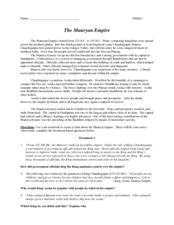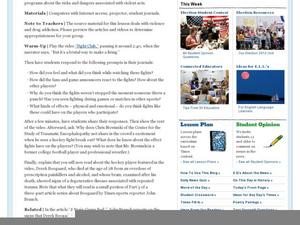Crafting Freedom
Harriet Jabocs and Elizabeth Keckly: The Material and Emotional Realities of Childhood in Slavery
Learning how to make accurate inferences by putting together facts found in multiple sources is one of those skills all learners must develop, but one that can be a challenge to teach. This resource is a must-have for your curriculum...
Crafting Freedom
Harriet Jabocs and Elizabeth Keckly: The Material and Emotional Realities of Childhood in Slavery
Through the journals written by Harriet Jacobs and Elizabeth Keckly, young readers gain insight into the lives of two enslaved children on nineteenth-century plantations.
Amnesty International
Hotel Rwanda Teacher's Guide
Here is the comprehensive, official educator's guide for presenting Hotel Rwanda and the story of the Rwandan genocide in 1994 to a classroom environment. It includes a range of exceptional hands-on or discussion activities, as well as a...
Global Oneness Project
Exploring Cultural Sustainability
Small groups learn about a present-day nomadic culture in Mongolia and the threats to its existence by exploring a photo essay. The resource includes thoughtful discussion and writing prompts about cultural sustainability, the...
Curated OER
The Mauryan Empire
Create a chart about the Maurayan Empire. Read the provided passage, make a chart, then analyze 3 excerpts. Questions need to be answered for each of the primary source excerpts. Making a reading chart is a good way to take notes!
Time Warp Trio
See You Later, Gladiator!
Young historians take a look at the age of gladiators, and the cultural atmosphere present when they staged their epic battles. Pupils pretend to be reporters and write newspaper articles about one of the events they stage. Then,...
Curated OER
Hanal Pixan
Students research the culture of Mexico. In this Mexican culture lesson, students view a PowerPoint presentation about the culture of Mexico and the students take notes. Students write an essay about what they have learned.
Facing History and Ourselves
The Weimar Republic: Historical Context and Decision Making
Did you know that way before Hitler became a dictator, he actually spent nine months in a German jail? Provide the background for the escalating point before the Nazi party took over in World War II through the exercises in the resource....
Curated OER
Lesson: Emory Douglas: Art and Activism
Visual literacy can be experienced in many different ways. Learners discuss the times, graphic art, and cultural significance of activism in art as they explore artist and Black Panther, Emory Douglas. This is a discussion-based lesson...
Curated OER
Lesson: Emory Douglas: Revolution in Our Time, Part 2
I love lessons like this because they let kids see the power of art, poetry, and activism in times of social injustice and unrest. They'll analyze the art used by Emory Douglas in the production of the Black Panther newspaper and...
New Museum of Contemporary Art
Lesson: Emory Douglas: What We Want, What We Believe!
One of the many appeals of this resource lies in its diverse application. Appropriate for US history, English, or art classes, scholars will appreciate the exploration of the civil rights movement through art, music, and film. They'll...
Curated OER
Lesson: Tlatelolco: Mexican Student Massacre 1968
The Massacre of Tlatelolco is the focus of a discussion-based lesson plan. Civil-minded learners consider the nature of student movements that have ended in violence based on over-reaction and government oppression. They discuss the...
Curated OER
Understanding King's Use of Metaphors in the
One of the most famous and well-crafted speeches of all time, Dr. Martin Luther King, Jr.'s "I Have a Dream" speech, consists of rich metaphors and rhetorical language. Using a provided graphic organizer, students analyze five quotes...
Curated OER
Modern Iran (1951 - Today)
Introduce your class to the often-mysterious world of Iran in this informative and engaging presentation. With political, social, and religious upheavals, Iran's recent history is a hot topic in recent news - as is its future. After this...
Curated OER
US Civil Rights Movement: Beginnings through the 60s
A real find for a U.S. History teacher, this presentation could supplement many class sessions about the Civil Rights Movement. Pictures of events, major figures, and "Whites Only" signs are striking and effective for even your most...
Curated OER
Air Pressure
Learners participate in a series of demonstrations about Bernoulli's principle. They explain how air pressure varies with air speed. They write a detailed lab report about the activity. This is a great way to explore this concept.
Curated OER
On 'Punched Out': Looking at Brain Trauma and Other Risks of Violent Sports
The tragic story of Derek Boogard, a hockey star whose sports-related brain injuries eventually lead to his death, is told through a series of videos. There are also articles that can be read. This poignant lesson gets participants to...
Curated OER
Sentence Completion 3: High-Intermediate Level
Need more sentence completion practice worksheets? Because this one comes with a detailed answer sheet, it could be used with those learners who need extra practice or as the basis of a reading strategies lesson.
Curated OER
Discussion Web for The Catcher in the Rye
Is Holden Caulfield a reliable narrator? Readers use the provided graphic organizer to record specific textual evidence from The Catcher in the Rye to support their response. A teacher copy of the template is provided.
National Endowment for the Humanities
Revolution '67, Lesson 1: Protest: Why and How
To some people, protesting is as American as apple pie, but the factors that lead to protests can be as confusing to veteran activists as to today's youth. Revolution '67 explores the riots in Newark, New Jersey as a case study. Using...
National Endowment for the Humanities
Revolution '67, Lesson 2: What Happened in July 1967? How Do We Know?
Even in a world in which dozens of participants and curious onlookers record every controversial event, the basic facts of what happened are often in dispute. Revolution '67, Lesson 2 explores 1967 Newark, New Jersey using an examination...
Alabama Department of Archives and History
America in Space: German Voices from Huntsville, Alabama
Project Paperclip, the Redstone Arsenal, and the Huntsville Space Center are all featured in a resource that investigates the contributions of Dr. Werner von Brawn and other German scientists to the US space program. Working individually...
Alabama Department of Archives and History
Convict Leasing in Alabama: a System That Re-Enslaved Blacks After the Civil War
The post-Civil War convict leasing program, rarely covered in textbooks, is the focus of a lesson that asks class members to use information drawn from primary source documents to assess the program. While the focus is on Alabama's...
Curated OER
Modernism: American Literature 1914-1945
What characterizes modern literature? The first few slides of this 31-slide PowerPoint discuss what sparked the change to Modernism and discuss some of the key figures of the time (like Karl Marx and Sigmund Freud). The 20s and 30s are...
Other popular searches
- Police Brutality
- Police Brutality Quotes
- Brutal Rape
- Holocaust Brutality
- Police Brutality Gypsy
- Indian Brutality

























